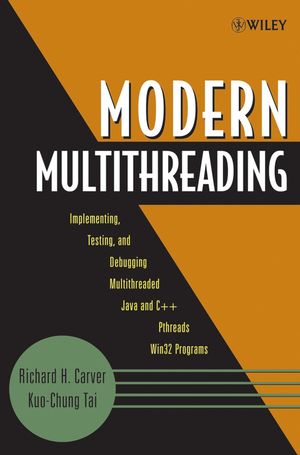Modern Multithreading: Implementing, Testing, and Debugging Multithreaded Java and C++/Pthreads/Win32 ProgramsISBN: 978-0-471-72504-6
Paperback
480 pages
October 2005
 This is a Print-on-Demand title. It will be printed specifically to fill your order. Please allow an additional 10-15 days delivery time. The book is not returnable.
|
||||||
1 Introduction to Concurrent Programming.
1.1 Processes and Threads: An Operating System’s View.
1.2 Advantages of Multithreading.
1.3 Threads in Java.
1.4 Threads in Win32.
1.5 Pthreads.
1.6 C++ Thread Class.
1.7 Thread Communication.
1.8 Testing and Debugging Multithreaded Programs.
1.9 Thread Synchronization.
Further Reading.
References.
Exercises.
2 The Critical Section Problem.
2.1 Software Solutions to the Two-Thread Critical Section Problem.
2.2 Ticket-Based Solutions to the n-Thread Critical Section Problem.
2.3 Hardware Solutions to the n-Thread Critical Section Problem.
2.4 Deadlock, Livelock, and Starvation.
2.5 Tracing and Replay for Shared Variables.
2.5.6 Note on Shared Memory Consistency.
Further Reading.
References.
Exercises.
3 Semaphores and Locks.
3.1 Counting Semaphores.
3.2 Using Semaphores.
3.3 Binary Semaphores and Locks.
3.4 Implementing Semaphores.
3.5 Semaphore-Based Solutions to Concurrent Programming
Problems.
3.6 Semaphores and Locks in Java.
3.7 Semaphores and Locks in Win32.
3.7.6 Example: C++/Win32 Bounded Buffer.
3.8 Semaphores and Locks in Pthreads.
3.9 Another Note on Shared Memory Consistency.
3.10 Tracing, Testing, and Replay for Semaphores and Locks.
Further Reading.
References.
Exercises.
4 Monitors.
4.1 Definition of Monitors.
4.2 Monitor-Based Solutions to Concurrent Programming Problems.
4.3 Monitors in Java.
4.4 Monitors in Pthreads.
4.5 Signaling Disciplines.
4.6 Using Semaphores to Implement Monitors.
4.7 Monitor Toolbox for Java.
4.8 Monitor Toolbox for Win32/C++/Pthreads.
4.9 Nested Monitor Calls.
4.10 Tracing and Replay for Monitors.
4.11 Testing Monitor-Based Programs.
Further Reading.
References.
Exercises.
5 Message Passing.
5.1 Channel Objects.
5.2 Rendezvous.
5.3 Selective Wait.
5.4 Message-Based Solutions to Concurrent Programming Problems.
5.5 Tracing, Testing, and Replay for Message-Passing Programs.
Further Reading.
References.
Exercises.
6 Message Passing in Distributed Programs.
6.1 TCP Sockets.
6.3 Timestamps and Event Ordering.
6.4 Message-Based Solutions to Distributed Programming Problems.
6.5 Testing and Debugging Distributed Programs.
Programs.
Further Reading.
References.
Exercises.
7 Testing and Debugging Concurrent Programs.
7.1 Synchronization Sequences of Concurrent Programs.
7.2 Paths of Concurrent Programs.
7.3 Definitions of Correctness and Faults for Concurrent Programs.
7.4 Approaches to Testing Concurrent Programs.
7.5 Reachability Testing.
Further Reading.
References.
Exercises.
Index.



